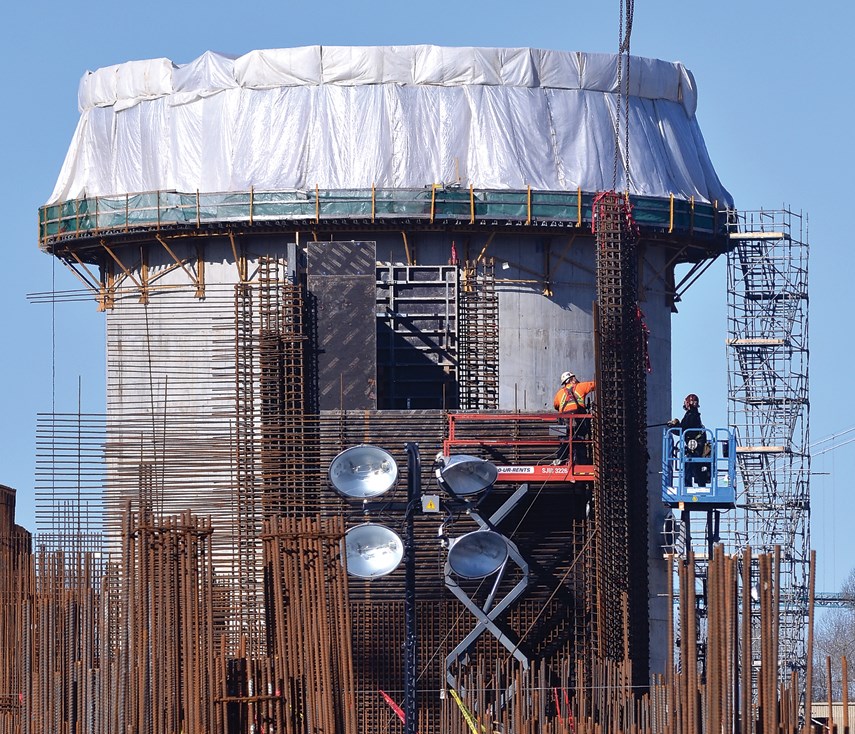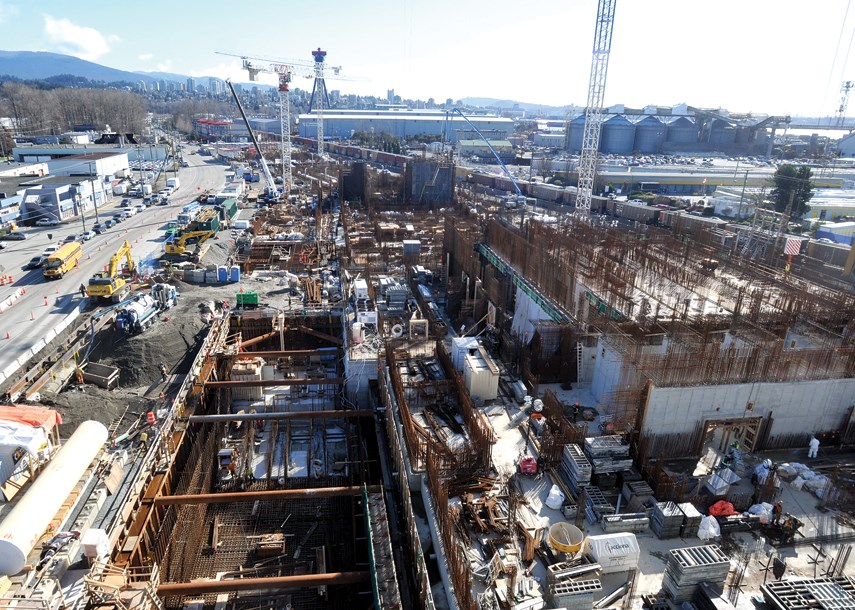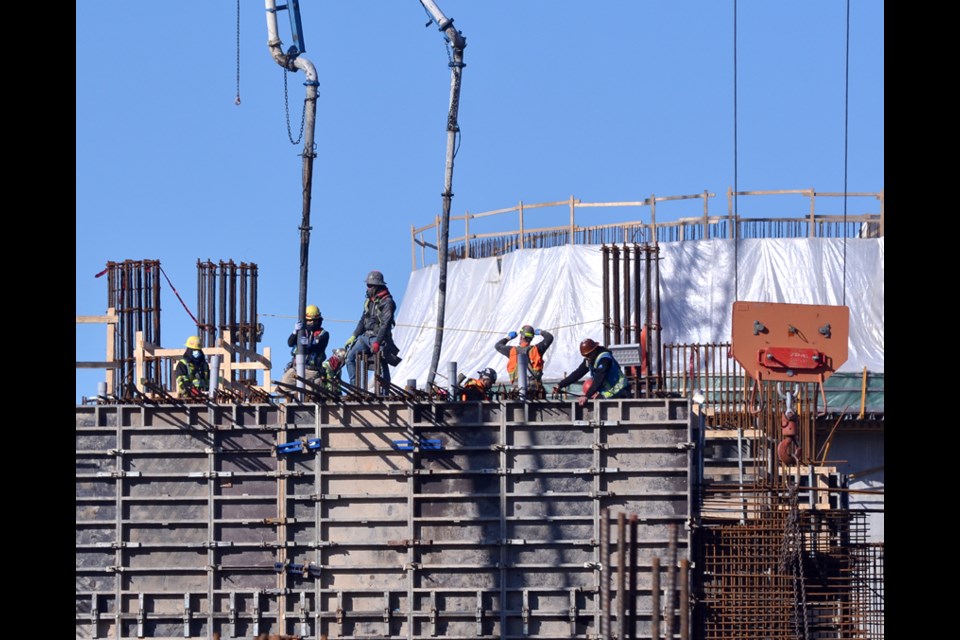Two weeks after work ground to a halt on the problem-plagued sewage treatment plant construction in North Vancouver, Metro Vancouver has ended its contract with the company charged with building the $1-billion project.
Metro Vancouver informed Acciona Wastewater Solutions it was ending the contract on Friday (Oct. 15), following a closed-door vote.
In a press statement, Jerry Dobrovolny, commissioner and CAO of Metro Vancouver, set out the regional government’s dissatisfaction with Acciona’s performance.
“Acciona has underperformed and consistently failed to meet its contractual obligations, which include delivering the project on time and within budget,” Dobrovolny wrote. “This project is already two and a half years behind schedule, and they’ve informed us that they require an additional two years.”
Dobrovolny said in an interview, Acciona had asked for an increase in the budget for the treatment plant “which would almost double the original contract price" from $525 million to over $1 billion for the wastewater treatment plant alone.
"We had major concerns, as do many others, about the financial impact of where we were headed with Acciona," said Dobrovolny. "And we can't allow a situation where they just keep coming back for more."

In response, Acciona released a statement Friday evening calling Metro's decision to end the contract "regrettable" and "unnecessary."
"Acciona has performed approximately $100 million in contracted work for which we have not received payment," the company stated in an email. The company said it had continued to work on the project, "contrary to recent statements of Metro Vancouver officials."
The company added the government knew the project "has been fraught with unforeseen challenges from the outset ... starting with flaws in the design provided by Metro Vancouver as part of the original bid process."
Acciona added Metro has requested "more than 1,000 major design changes and other alterations to the original contract, while demanding Acciona absorb the resulting project delays and increased costs."
Dobrovolny said Metro Vancouver will search for a new contractor to finish the project as soon as possible. This time, the government has engaged a panel of experts to review the process of selecting a new contractor as well as a revised budget and construction schedule.
District of North Vancouver Mayor Mike Little, who sits on Metro’s liquid waste management committee, said in a statement he was disappointed the relationship between Metro and Acciona had broken down but supported the decision to end the contract.
“It is the right decision in order to protect the interests of the region. The continued disruption and construction is having a significant impact on local businesses in the area and on the Norgate neighbourhood in general, and I encourage Metro Vancouver to find a path forward quickly,” he wrote.
Gears stopped turning on the massive infrastructure project at the end of September after Acciona laid off a significant number of workers, leaving only a skeleton crew of about 60 workers. Previously, more than 300 people worked on the construction project.
The original contract to build the massive wastewater treatment plant was awarded to Acciona in 2017.
The contract to build the plant was reopened in 2019 to give the company two and a half more years to complete the project, to recognize issues like difficult soil conditions, Dobrovolny said. Under the last contract, Acciona was supposed to complete the project by the end of 2023.
It's unclear how soon the government hopes a new contractor could be in place or what the change in contractors will mean for the project budget and completion schedule.
But Dobrovolny acknowledged it will mean "the schedule and the cost are longer and higher than what we anticipated."
The construction of the treatment plant on McKeen Avenue in North Vancouver is already years behind schedule and millions of dollars over its original budget.

In March, Metro Vancouver released costs that put revised estimates for the project cost at $1.058 billion – over $100 million more than the previous cost estimate that had pegged the project cost at $882 million.
North Shore taxpayers are paying the lion's share of the cost for the plant, although some of the cost is split throughout the Metro region. Recently, North Shore municipalities requested that their share of the debt that is financing the plant be paid back over 30 years, rather than the usual 15 years, in order to bring down annual costs to taxpayers. The Metro board is set to consider that at the end of this month.
Capital costs of building three new sewage treatment plants are expected to contribute to a significant hike in regional Metro taxes beginning around 2024 or 2025.
“It’s a significant capital expense to the organization,” Dobrovolny told politicians at Metro's liquid waste management committee Thursday. "There is a cost to these core services. The work needs to be done."
Construction on the project was initially supposed to start in 2014, but didn't get underway until 2018.
In April 2019 the District of North Vancouver slapped a stop-work order on the site after Acciona terminated one of its leading geotechnical engineering contractors, Tetra Tech. That resulted in Tetra Tech filing a $20-million lawsuit.
After public pressure from environmental advocates, the design of the plant was changed in 2019 to enable tertiary sewage treatment, adding $29 million to the project budget, then estimated at $778 million.
For decades, the approximately 31-billion litres of waste being flushed into Burrard Inlet has been treated to only a very basic "primary" level – which essentially involves taking out the biggest "solids" through mechanical processes. In 2012, new federal government regulations spelled out secondary treatment – which adds bacteriological breakdown of waste – as the minimum standard required for sewage treatment, and set a deadline of December 2020 by which older plants had to be upgraded.
The tertiary system now being built on the North Shore is the same as the $775-million tertiary system recently completed in Victoria's Capital Regional District after four years of construction.





